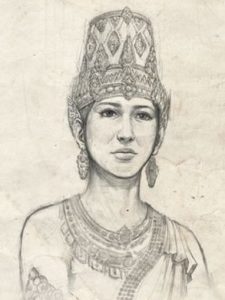9 April 2015: Gayatri Rajapatni – The Woman Behind the Glory of Majapahit April 30, 2015 – Posted in: Newsletters

Gayatri was “an influential matriarch figure of the Majapahit inner circle within the palace.” (Image: Wacana Nusantara)
This book brings to life some of the most colourful women in history. The author depicts the court which ruled the largest empire ever to appear in Southeast Asia in a believable and accurate way. I hope that this novel will attract more people to learn about the fascinating history of this region. – Dr John N. Miksic (Department of Southeast Asian Studies, National University of Singapore)
The kingdom of Majapahit, once centred in present-day Java, Indonesia, grew to become one of the country’s most glorious empires. From the late thirteenth century until the early years of the sixteenth century, Majapahit slowly expanded its reach, incorporating parts of Sumatra, Malaysia and Bali into its realm, as well as many other regions along the Straits of Malacca. Its rich history includes tales of battles with and against the Mongols, of wise kings and queens, and of an inclusive spiritual tradition; its legacy includes Indonesia’s greatest works of sculpture, a unique architectural style still to be found in Bali, and epic poems such as the Nagarakrtagama. Many historians have shown that the Majapahit kingdom and its great Prime Minister Gajah Mada first united the many islands of Indonesia together under one rule. By searching through the literature of the era, author and historian Earl Drake found that one historical figure played a key role from the beginning of the Majapahit kingdom until its glory days under King Hayam Wuruk: Gayatri Rajapatni. Born a princess in her father’s kingdom of Singhasari, she married Majapahit’s first king, gave birth to its first queen, and was grandmother to Hayam Wuruk, its most successful leader. She witnessed the rise of the kingdom, was beloved by its people, and was greatly praised by all after her death. In Gayatri Rajapatni: The Woman Behind the Glory of Majapahit, Drake imaginatively re-creates Gayatri’s world, placing her at the centre of Majapahit’s great history. Rich in historical detail and dramatic prose, Drake’s story sheds light on one of Indonesia’s forgotten leaders, and one of its most powerful kingdoms.
Author Earl Drake spent most of his long career as a diplomat trying to promote cooperation and understanding between Canada and other countries, mostly in Asia. He gradually worked his way up from mid-rank assignments in Pakistan, Malaysia and Burma to senior positions as Canada’s Executive Director at the World Bank in Washington and then as Ambassador, first to Indonesia and later to China. During his international career, he never forgot his academic training in history and his early days as a university lecturer, an archivist, and a commissioned author of a civic history book. After retiring from Canada’s Foreign Service in 1992, he took up new positions initially at Vancouver’s Simon Fraser University and later at the University of British Columbia. These have enabled him to combine his interest in history with his career focus on fostering Western understanding of Asia.
This work transports us to an exposition of a historical figure who was instrumental in the rise of a dynasty which became the largest imperium in the Nusantara. With an attractive narrative and the use of primary sources on Majapahit such as Nagarakrtagama and Pararaton, this book is most suitable as an introduction for all those who are interested in the classical period of Asia. Adrian Perkasa (Executive Director, Indonesian Heritage Trust), author of Orang-Orang Tionghoa dan Islam di Majapahit (The Chinese and Islam in Majapahit)
Gayatri Rajapatni is now available from Areca Books. RM40 (hardcover)/RM30 (paperback)
For orders from UK, Europe, US, Canada, Australia
Price per copy including shipping and handling:
£24, €34, US$40, C$48, A$52 (hardcover)
£18, €26, US$30, C$36, A$39 (paperback)
For multiple copies, please write to arecabooks@gmail.com
